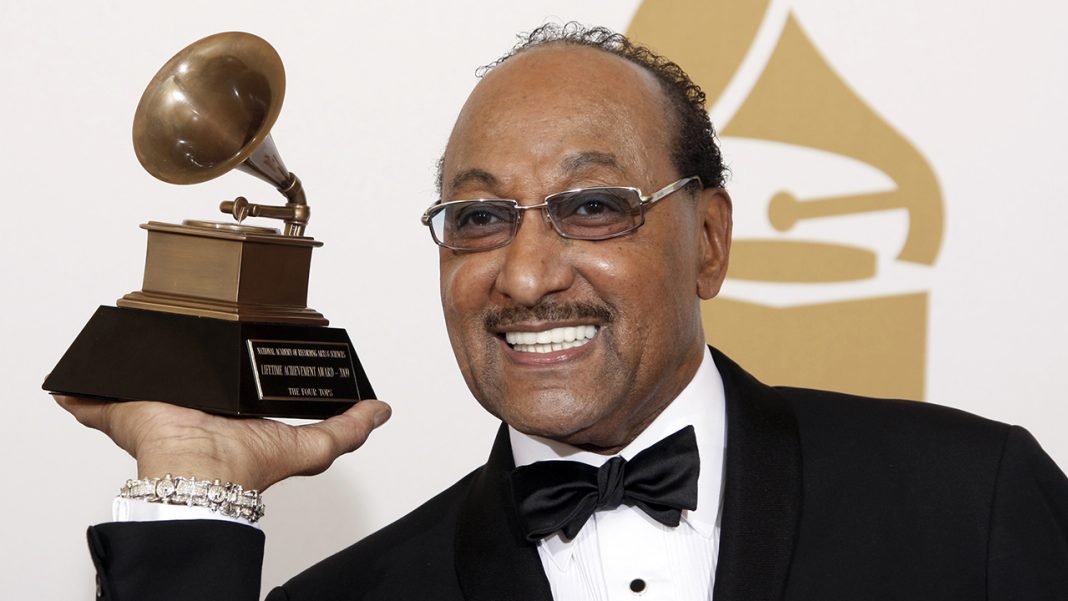Abdul “Duke” Fakir, the last surviving original member of the iconic Motown group the Four Tops, passed away at the age of 88. Fakir, known for his smooth tenor vocals, was a key figure in the group’s success. He died on Monday from heart failure at his home in Detroit, surrounded by his wife and loved ones.
For Motown founder Berry Gordy, Fakir’s contribution to the Four Tops was immeasurable. He praised Fakir for embodying the group’s “showmanship, class, and artistry.” Gordy described him as a smooth and suave performer who played a vital role in maintaining the Four Tops’ remarkable legacy throughout their impressive 70-year career.
The Four Tops were one of Motown’s most enduring acts, reaching their peak in the 1960s. During this period, they achieved 11 top 20 hits and two number one singles: “I Can’t Help Myself (Sugar Pie, Honey Bunch)” and the operatic classic “Reach Out I’ll Be There.” Their discography also included other notable songs such as “Baby I Need Your Loving,” “Standing in the Shadows of Love,” “Bernadette,” and “Just Ask the Lonely.”
It’s important to note that the Four Tops had already been performing together for a decade before signing with Motown in 1963. They had a polished stage act and a versatile vocal style that allowed them to excel in various genres, from country to pop standards. Initially known as the Four Aims, they changed their name to the Four Tops to avoid confusion with another harmony quartet.
Gordy and A&R man Mickey Stevenson paired the Four Tops with the renowned songwriting-production team of Eddie Holland, Lamont Dozier, and Brian Holland. This collaboration proved to be a turning point for the group, as they quickly gained popularity. The tight harmonies behind Levi Stubbs’ urgent baritone resonated with audiences, creating a unique and captivating sound.
After the departure of Holland-Dozier-Holland from Motown in 1967, the Four Tops experienced more sporadic success. They had hits like “Still Water (Love)” and achieved two top 10 songs in the early 1970s with ABC/Dunhill Records: “Keeper of the Castle” and “Ain’t No Woman (Like the One I’ve Got).” Their last top 20 hit came in the early 1980s with the sentimental ballad “When She Was My Girl.”
While many of their peers in the industry faced drug problems, dissension, and personnel changes, the Four Tops remained united and intact until the passing of Lawrence Payton in 1997. The group’s professionalism, camaraderie, and timeless music made a lasting impression on fellow musicians. Stevie Wonder, who helped induct them into the Rock and Roll Hall of Fame in 1990, praised their character and talent.
Following the loss of his fellow band members, Fakir faced a difficult decision. He ultimately chose to continue performing as the Four Tops, joined by lead vocalist Alexander Morris, Ronnie McNeir, and Lawrence ‘Roquel’ Payton Jr., the son of Lawrence Payton. This decision was met with positive reception from audiences, confirming that he had made the right choice.
The Four Tops received numerous accolades throughout their career, including induction into the Rock and Roll Hall of Fame and the Grammy Hall of Fame. In 2009, they were honored with a Grammy lifetime achievement award. Fakir himself had been working on a Broadway musical based on their lives and completed his memoir, “I’ll Be There,” which was published in 2022.
Beyond his musical achievements, Fakir had a rich personal life. He was married to Piper Gibson for 50 years and had seven children, six of whom survive him. In the mid-1960s, he was briefly engaged to Mary Wilson of the Supremes. Fakir’s commitment to his hometown of Detroit was unwavering, as he chose to remain there even after Motown moved its label to Los Angeles.
Fakir’s upbringing in a rough neighborhood, where Black and white gangs frequently clashed, shaped his early years. He had dreams of becoming a professional athlete but also possessed a remarkable singing talent. Fakir’s involvement in his church choir allowed him to showcase his tenor voice, which eventually led him to meet Levi Stubbs. The two joined forces with Renaldo “Obie” Benson and Lawrence Payton, and the Four Tops were born.
Abdul “Duke” Fakir’s passing marks the end of an era for Motown and the music industry as a whole. His contributions to the Four Tops’ success will forever be remembered, and his smooth tenor voice will continue to captivate audiences through their timeless hits. His dedication to preserving the group’s legacy and his commitment to professionalism and camaraderie have left an indelible mark on the music world.


